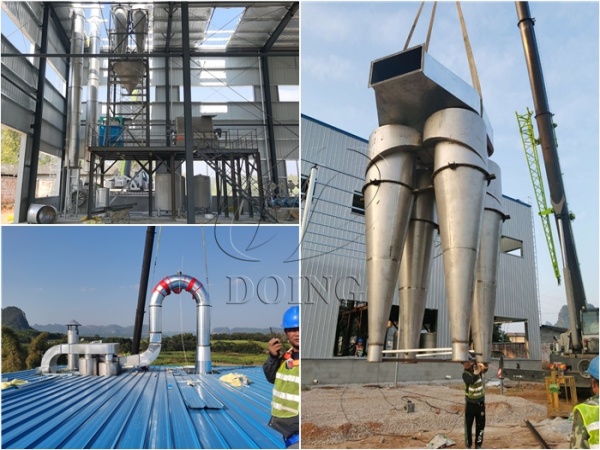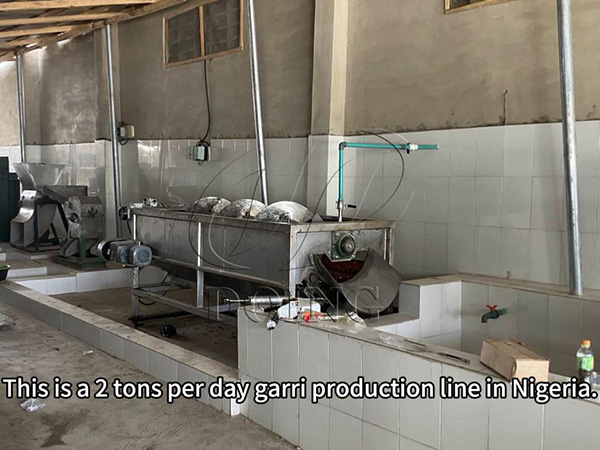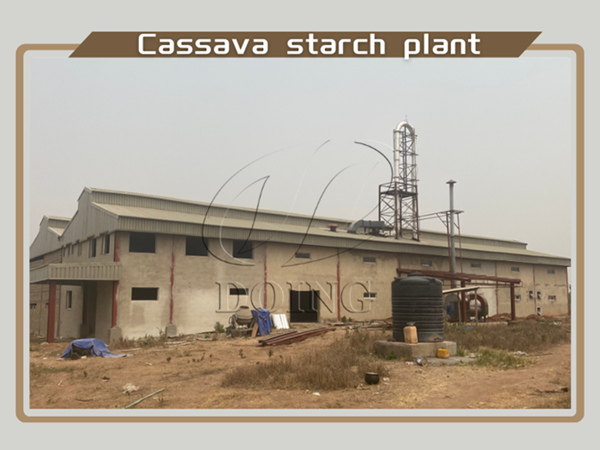
Good Agro deep processing example: cassava chips boost ethanol industry
FAQ/ Chat online/ Leave a message/ August 6, 2025
The global demand for renewable energy sources has driven innovation in agro deep processing, particularly in the production of biofuels. One standout example is the use of cassava chips as a key raw material for ethanol production.
Today, Henan Jinrui, as a professional manufacturer of cassava processing equipment, will explain to you how cassava chips are converted into ethanol, and explore the positive effects of cassava chips on the ethanol industry in terms of cost, production process and environmental protection.
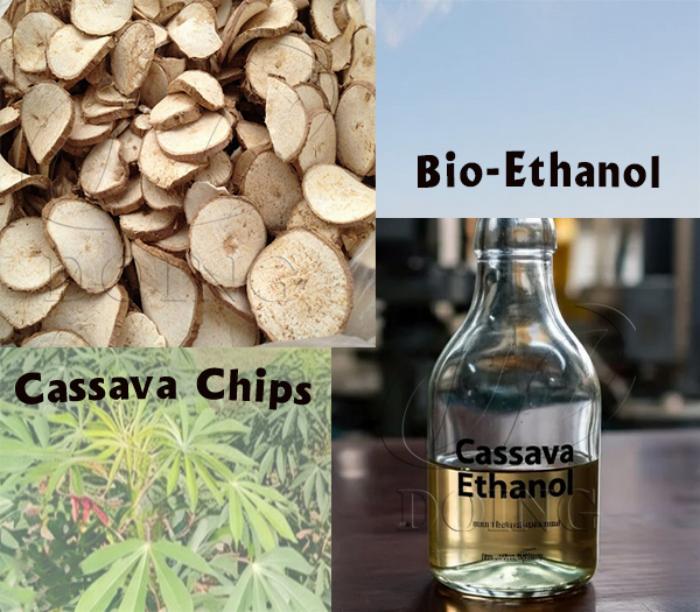 Process cassava chips to ethanol
Process cassava chips to ethanol
How are cassava chips processed into ethanol?
Cassava chips have a wide range of uses in agricultural deep processing, one of the most prominent of which is in ethanol production. Cassava has a high starch content, making it an ideal raw material for producing bio-fuels -- ethanol. Cassava chips are processed into ethanol through a series of steps involving starch conversion and fermentation. First, the cassava chips are milled into a fine powder, then cooked to gelatinize the starch. Enzymes are added to break down the starch into fermentable sugars, primarily glucose. This sugar solution is then fermented by yeast, producing ethanol. Finally, the ethanol is separated from the fermentation broth through distillation.
How can cassava chips boost ethanol industry?
Above, we've covered the simple steps for processing cassava chips into ethanol. So, why are more and more ethanol producers choosing cassava chips as the raw material? Compared to other ethanol raw materials, such as corn and sugarcane, what advantages do cassava chips offer that can boost the ethanol industry? Below is Henan Jinrui's analysis of the economic benefits, processing flow, and environmental advantages of using cassava chips as an ethanol raw material:
 Cassava chips making machine
Cassava chips making machine
Cost - Effective and Sustainable
Using cassava chips for ethanol production is not only cost - effective but also sustainable. Cassava chips are rich in starch, typically exceeding 75% on a dry basis, a higher starch content than other potential raw materials, such as corn. Furthermore, the cost per ton of cassava chips is significantly lower than other raw materials, meaning more ethanol can be processed for the same cost. In addition, cassava are widely cultivated as a food crop, making cassava chips easier to obtain and store than other raw materials, contributing to a long-term, stable supply of raw materials for the ethanol industry. The cost - effective and sustainable advantage of cassava chips as an raw material has boosted the ethanol industry, making them a preferred raw material for ethanol processing.
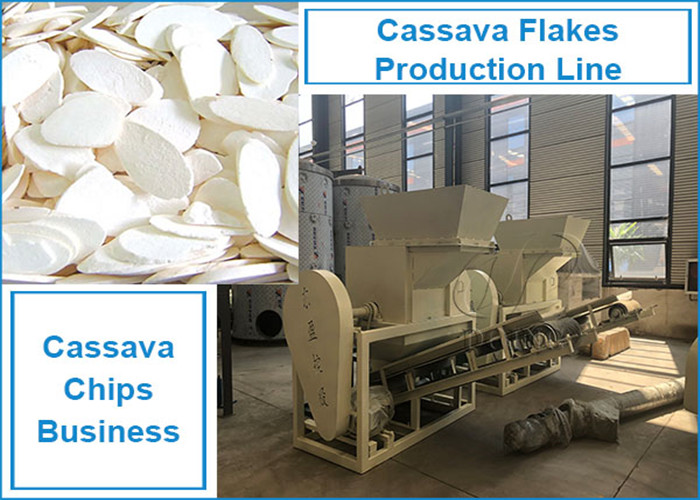 Cassava chips processing business
Cassava chips processing business
Simplified Production Process
Compared to traditional corn ethanol production, cassava chip ethanol production requires only milling, fermentation, and cooking, eliminating complex processes like degerming and defibering. This reduces investment in ethanol processing equipment by 20%-30%. Furthermore, the fermentation cycle for ethanol produced from cassava chips takes only 48 hours, significantly shorter than that of corn (72h). This means that using cassava chips as a raw material can produce a greater capacity of ethanol in the same amount of time. Using cassava chips simplifies the production process, improves processing efficiency, significantly boosting the ethanol processing industry.
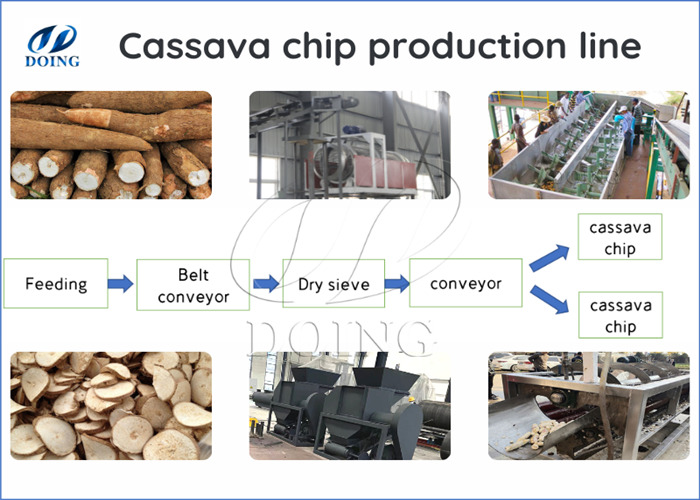 Cassava chips production line
Cassava chips production line
Environmental Benefits
The use of cassava chips in the ethanol industry also brings environmental benefits. Ethanol produced from cassava chips can be used as a bio-fuel, which has a lower carbon footprint compared to fossil fuels. When burned, bio-ethanol emits fewer greenhouse gases, contributing to a reduction in overall carbon emissions. This is in line with the global efforts to mitigate climate change and transition towards a more sustainable energy future. The use of cassava chips to produce ethanol as bio-fuel is also a trend of future green development and occupies an important position in the ethanol processing industry.
The transformation of cassava chips into ethanol exemplifies how agro processing can drive sustainable industrial growth. The high starch content, cost - effectiveness, and sustainability make cassava chips an ideal raw material for ethanol production, boosting the ethanol industry.
As the demand for clean and renewable energy sources continues to grow, the role of cassava chips in the ethanol industry is likely to expand further. As the demand for cassava chips grows, more and more processors are starting to get involved in cassava chip processing. If you also want to start a cassava chip processing business to cater to the high-demand bio-ethanol industry, welcome to contact Henan Jinrui, we will provide you with professional cassava chip processing equipment!
Leave A Message
- Do you want to buy machine?
- Yes, I want to buy machine
- No, I want to learn more in advance.
- What is your raw material?
- Cassava
- Potato
- Sweet potato
- Others
- 2. What is the final product you want to produce?
- Garri
- Cassava flour
- Cassava starch
- Cassava chips
- Attiekie
- Bammy
- Others
- 3.What is your capacity plan?
- Small scale garri machine
- 1ton per day
- 2tons per day
- 3tons per day
- 10tons per day
- 20tons per day
- Others
- 3.What is your capacity plan?
- Small scale
- 5tons per day
- 10tons per day
- 20tons per day
- 50tons per day
- 100tons per day
- Others
- 3.What is your capacity plan?
- Small scale
- 5tons per day
- 10tons per day
- 20tons per day
- 50tons per day
- 100tons per day
- 200tons per day
- 300tons per day
- Others
- 3.What is your capacity plan?
- Small scale
- Middle type
- Large scale
- What is your capacity plan?
- Small scale
- 5tons per day
- 10tons per day
- 20tons per day
- 50tons per day
- 100tons per day
- 200tons per day
- 300tons per day
- Others

